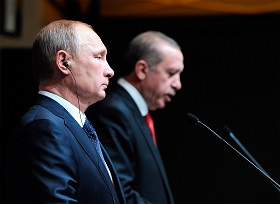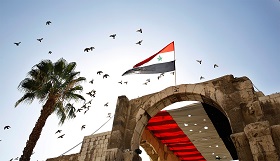While the world was watching how the diplomatic conflict between Moscow and Ankara would play out Russia made a number of surprising strategic decisions that may change the rules of the game in the Levant and the Mediterranean. Following the downing of the Russian fighter jet Moscow made a swift decision to deploy its newest S-400 air defense system to the base in Latakia and the naval version of S-300 on Moskva cruiser off the coast of Syria.
The incident that occurred in the skies over Syria when a Turkish F-16 shot down a Russian Su-24 got the whole world talking about how close we came to an all-out conflict in the Middle East. Some commentators have suggested that today we are closer to an open conflict between Russia and NATO than ever before since the collapse of the Soviet Union. Quite surprisingly while Russia watchers have insisted that if a conflict between the alliance and Moscow is to erupt it will take place in Eastern Europe, yet now it’s the Middle East and not Ukraine where tensions between the two are running high.
While the world was watching how the diplomatic conflict between Moscow and Ankara would play out Russia made a number of surprising strategic decisions that may change the rules of the game in the Levant and the Mediterranean. Following the downing of the Russian fighter jet Moscow made a swift decision to deploy its newest S-400 air defense system to the base in Latakia and the naval version of S-300 on Moskva cruiser off the coast of Syria.
The Russian anti-airshaft and missile defense systems engage numerous targets simultaneously with their radars allowing the operator to peep deep into the adversary’s airspace. S-400 and Fort, the naval version of S-300, will cover almost the entire territory of Syria including the capital Damascus, southern regions of Turkey, all of Cyprus and Lebanon as well as half of Israel and Jordan.
The deployment of these systems by Russia is both good and bad news for regional powers. Turkey and Israel are likely to be outraged at this decision given the fact that they have been in control of the Levantine sky for many years. Israeli pilots made regular sorties in Syria and reportedly bombed Assad’s targets there. Turkish pilots have carried out strikes against Kurds in Northern Syria on several occasions.
Turkey and Israel resisted Russia’s attempts to supply S-300 systems to Damascus in 2012. Israel even threatened to take out missiles if they had ever arrived in Syria. S-400 systems are more advanced than S-300 and they certainly impose limits on Israel’s and Turkey’s operations over Syria and in the region in general. One day after the deployment of Russian systems Ankara even decided to suspend flights of its fighter jets over Syria. This was Moscow’s way to introduce a no-fly zone that the United States and Turkey have mulled for several months.
The good news is that Russia decided to deploy S-400 at its base in Latakia and not to deliver the systems to Bashar Al Assad. But the reason why the US, Turkey, Israel and the GCC would be worried about this move is crystal clear: they fear that sooner or later the S-400 may end up in Assad’s hands. While the Syrian Arab Army is not trained to use these air defense systems, with S-400 already being on the ground it is only a matter of time until they know how to operate it.
One other consequence of Turkey downing a Russian Su-24 is that Moscow has opted to further beef up its military presence in Syria. Following the Paris terrorist attack and the Sinai plane crash the Russian Ministry of Defense decided to double the number of jets operating in Syria to 44 in order to carry out attacks against the Islamic State in Raqqa and Deir Ez-Zor provinces. As a response to Turkey shooting down a Russian jet the Ministry made a decision to deploy 10-12 more Su-27 and Su-30 jets to provide cover for frontline bombers during operations. What this means is that the Russia Air Force will be able to carry out air strikes on both fronts, against ISIS in Raqqa and against other rebel groups in northwest Syria.
Following the incident Moscow feels betrayed by Turkey with whom it agreed to share intel on Syria in October 2015. Russian officials repeat that there is no way Ankara could not have known it was a Russian fighter its F-16 shot down. This is the reason why more assertive actions should be expected from Moscow from now on, not only in rebel-held areas but on the political front as well.
One of the key points of contention between Russia and Turkey has lately been the future of Kurdistan. Moscow has been on good terms with Syrian Kurds recently and even hosted representatives of the Kurdish Democratic Union Party discussing the prospects of setting up a permanent PYD mission in Russia with them. The move was met with criticism in Ankara with Turkish officials warning Moscow that it could permanently damage the Turkey-Russia relationship.
According to some reports Russia may have backed Kurds in Aleppo in the past few days by carrying out strikes at the YPG-FSA touch line. The Kurdish forces allegedly used Russian airstrikes to retake a portion of the rebel-controlled areas that were under attack. Following the downing of a Russian fighter jet Moscow is likely to intensify contacts with Kurds in Syria and possibly start supporting their territorial ambitions to irritate Ankara.
Turkey’s decision to shoot down a Russian fighter jet that may or may not have violated its airspace, which would normally be seen as an act of war, clearly took NATO aback. The Alliance released a low-key statement following the incident, and according to some accounts there was no unity within NATO over Ankara’s response to alleged violation of its border.
Russia’s reaction to the downing of its jet was harsh diplomatically, yet very pragmatic strategically. Moscow has shifted the security balance in the region in the Syrian government’s favor as well as made sure that Turkey’s military acts with more restraint from now on. More importantly, however, Russia sent a clear signal to the West that it also has “red lines” in Syria, which cannot be crossed by others.






